译林版牛津初中英语八年级上册Unit8Naturaldisasters知识点归纳及巩固练习题、参考答案
- 格式:pdf
- 大小:38.17 KB
- 文档页数:5
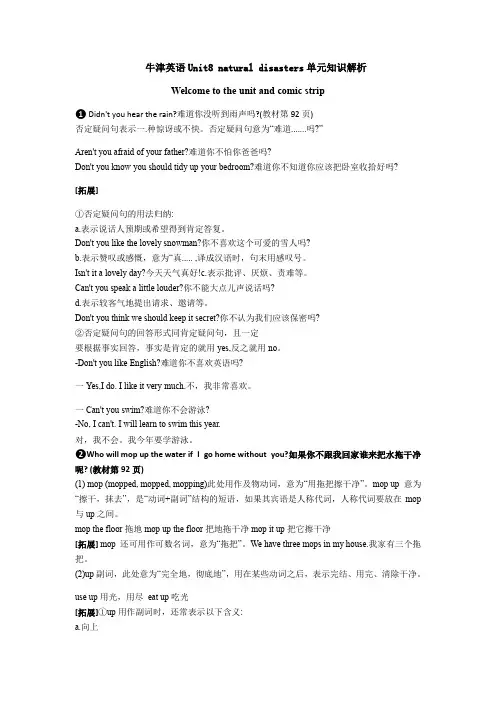
牛津英语Unit8 natural disasters单元知识解析Welcome to the unit and comic strip❶ Didn't you hear the rain?难道你没听到雨声吗?(教材第92页)否定疑问句表示一.种惊讶或不快。
否定疑问句意为“难道.......吗?”Aren't you afraid of your father?难道你不怕你爸爸吗?Don't you know you should tidy up your bedroom?难道你不知道你应该把卧室收拾好吗?[拓展]①否定疑问句的用法归纳:a.表示说话人预期或希望得到肯定答复。
Don't you like the lovely snowman?你不喜欢这个可爱的雪人吗?b.表示赞叹或感慨,意为“真..... ,译成汉语时,句末用感叹号。
Isn't it a lovely day?今天天气真好!c.表示批评、厌烦、责难等。
Can't you speak a little louder?你不能大点儿声说话吗?d.表示较客气地提出请求、邀请等。
Don't you think we should keep it secret?你不认为我们应该保密吗?②否定疑问句的回答形式同肯定疑问句,且一定要根据事实回答,事实是肯定的就用yes,反之就用no。
-Don't you like English?难道你不喜欢英语吗?一Yes,I do. I like it very much.不,我非常喜欢。
一Can't you swim?难道你不会游泳?-No, I can't. I will learn to swim this year.对,我不会。
我今年要学游泳。
❷Who will mop up the water if I go home without you?如果你不跟我回家谁来把水拖干净呢? (教材第92页)(1) mop (mopped, mopped, mopping)此处用作及物动词,意为“用拖把擦干净”。
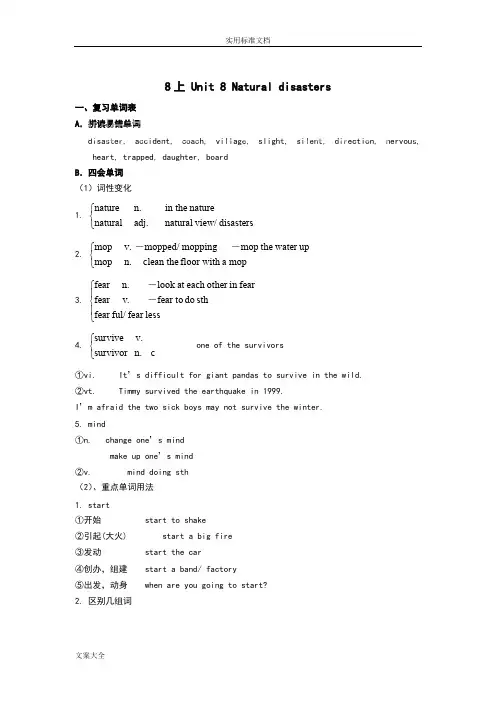
8上 Unit 8 Natural disasters一、复习单词表A .拼读易错单词disaster, accident, coach, village, slight, silent, direction, nervous,heart, trapped, daughter, boardB .四会单词(1)词性变化1. ⎩⎨⎧disastersview/ natural adj. natural naturein the n. nature 2. ⎩⎨⎧mopa floor with clean the n. mop up water the mop mopping mopped/ v.mop --3. ⎪⎩⎪⎨⎧less fear ful/ fear sthdo fear to .fear v fear in other each at look n.fear --4. one of the survivors⎩⎨⎧c n. survivor v.survive ①vi. It’s difficult for giant pandas to survive in the wild.②vt. Timmy survived the earthquake in 1999.I’m afraid the two sick boys may not survive the winter.5. mind①n. change one’s mindmake up one’s mind②v.mind doing sth(2)、重点单词用法1. start①开始start to shake ②引起(大火)start a big fire ③发动start the car ④创办,组建start a band/ factory ⑤出发,动身when are you going to start?2. 区别几组词a. b. ⎪⎪⎩⎪⎪⎨⎧live lively living alive ⎪⎪⎩⎪⎪⎨⎧excitement excitedly exciting excited/ excite c. d. ⎪⎪⎩⎪⎪⎨⎧oneself tell oneselftalk to oneself say to oneself ask ⎪⎪⎩⎪⎪⎨⎧down cut downfall down come down calm 3. ⎩⎨⎧foggiestfoggier/ adj.foggy n.fog -⎩⎨⎧ tomorrow.____________much be It will tomorrow._________much be will There 9. cover1)cover sth2)cover A with B3)be covered with4)be covered live4. ⎩⎨⎧n.arrival v.arrive What was the time of his arrival?When the vet arrived, the dog ⎩⎨⎧hour an half for dead been had died had 5. hurt-hurt/ hurt①vi.My back hurt.②vt.He hurt his left leg.③adj.be/ get (badly) hurt 6. ⎩⎨⎧-可与表否定的词连用用-不可与表否定的词连almost nearly ①nearly the same②He’s almost/ nearly as tall as me.③Almost nothing can prevent him going there.二、 重要词组、句型用法1. natural 词性__________ 意思是________e.g.自然灾害____________ 自然科学(n.)______ 意思是_______e.g. nature reserve 意思是_____________Milk is the __________food for young babies. 牛奶是婴儿的天然食物。
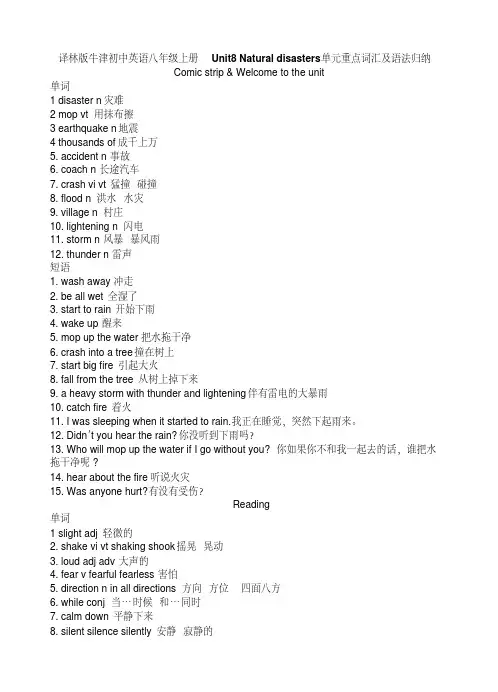
译林版牛津初中英语八年级上册Unit8 Natural disasters单元重点词汇及语法归纳Comic strip & Welcome to the unit单词1 disaster n 灾难2 mop vt 用抹布擦3 earthquake n 地震4 thousands of 成千上万5. accident n 事故6. coach n 长途汽车7. crash vi vt 猛撞碰撞8. flood n 洪水水灾9. village n 村庄10. lightening n 闪电11. storm n 风暴暴风雨12. thunder n 雷声短语1. wash away 冲走2. be all wet 全湿了3. start to rain 开始下雨4. wake up 醒来5. mop up the water 把水拖干净6. crash into a tree 撞在树上7. start big fire 引起大火8. fall from the tree 从树上掉下来9. a heavy storm with thunder and lightening 伴有雷电的大暴雨10. catch fire 着火11. I was sleeping when it started to rain. 我正在睡觉,突然下起雨来。
12. Didn’t you hear the rain? 你没听到下雨吗?13. Who will mop up the water if I go without you? 你如果你不和我一起去的话,谁把水拖干净呢?14. hear about the fire 听说火灾15. Was anyone hurt? 有没有受伤?Reading单词1 slight adj 轻微的2. shake vi vt shaking shook 摇晃晃动3. loud adj adv 大声的4. fear v fearful fearless 害怕5. direction n in all directions 方向方位四面八方6. while conj 当…时候和…同时7. calm down 平静下来8. silent silence silently 安静寂静的。
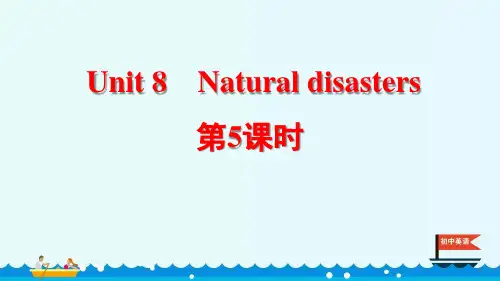
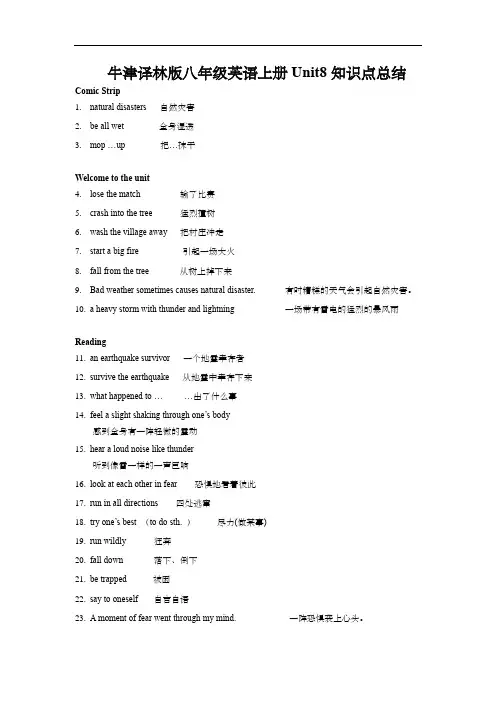
牛津译林版八年级英语上册Unit8知识点总结Comic Strip1.natural disasters 自然灾害2.be all wet 全身湿透3.mop …up 把…抹干Welcome to the unit4.lose the match 输了比赛5.crash into the tree 猛烈撞树6.wash the village away 把村庄冲走7.start a big fire 引起一场大火8.fall from the tree 从树上掉下来9.Bad weather sometimes causes natural disaster. 有时糟糕的天气会引起自然灾害。
10.a heavy storm with thunder and lightning 一场带有雷电的猛烈的暴风雨Reading11.an earthquake survivor 一个地震幸存者12.survive the earthquake 从地震中幸存下来13.what happened to … …出了什么事14.feel a slight shaking through one’s body感到全身有一阵轻微的震动15.hear a loud noise like thunder听到像雷一样的一声巨响16.look at each other in fear 恐惧地看着彼此17.run in all directions 四处逃窜18.try one’s best (to do sth. )尽力(做某事)19.run wildly狂奔20.fall down落下、倒下21.be trapped 被困22.say to oneself自言自语23.A moment of fear went through my mind. 一阵恐惧袭上心头。
24.tell sb to calm down让我自己平静下来25.shout for help大声呼救26.stay alive活着27.a packet of chocolate 一包巧克力28.try to find my way out 尽力找到出路29.hear shouts from excited people听到激动的人们的呼喊声30.be in a great hurry to do sth急匆匆地去做…31.move away the bricks 把砖块搬开32.the loud noise following lightning紧随闪电过后的巨大声响33.be trapped in a dark place被困在一个昏暗的地方be trapped under the bricks and stones被困在砖块和石头下面Grammar34.look for some photos of …for… 为…寻找…的照片35.discuss…with…与…讨论discussion n.36.plan a trip to计划到…旅行37.try to find a map of 尽力找到…地图38.A snowstorm hit the city early this morning. 一大清早,一场暴风雪袭击了这个城市。
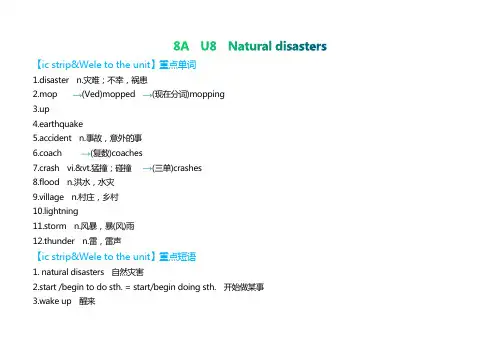
【ic strip&Wele to the unit】重点单词1.disaster n.灾难;不幸,祸患2.mop (Ved)mopped (现在分词)mopping3.up4.earthquake5.accident n.事故,意外的事6.coach (复数)coaches7.crash vi.&vt.猛撞;碰撞(三单)crashes8.flood n.洪水,水灾9.village n.村庄,乡村10.lightning11.storm n.风暴,暴(风)雨12.thunder n.雷,雷声【ic strip&Wele to the unit】重点短语1. natural disasters 自然灾害2.start /begin to do sth. = start/begin doing sth. 开始做某事3.wake up 醒来4.mop up 把......拖干净5.mop up the water 把水拖干净6.thousands of people 成千上万的人7.thousands of 成千上万的8.crash into 撞上9.wash away 冲走10.fall from ... 从...·落下11.hear about/of 听说12.what happened 发生了什么13.a heavy storm with thunder and lightning 一场雷电交加的大风暴14.catch fire 着火【ic strip&Wele to the unit】重点句型1. Didn't you hear the rain?难道你没听到雨声吗?2. Who will mop up the water if I go home without you? 如果你不跟我回家,谁将拖干水呢?3. Lightning hit a classroom building and it caught fire. 一幢教学楼被闪电击中而着火了。
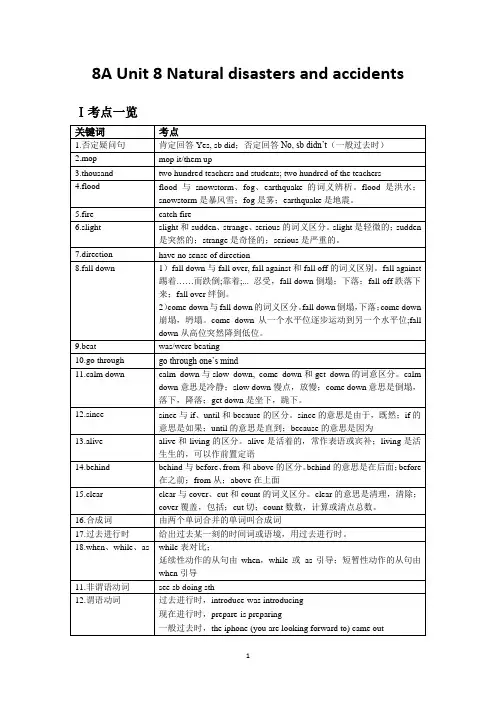
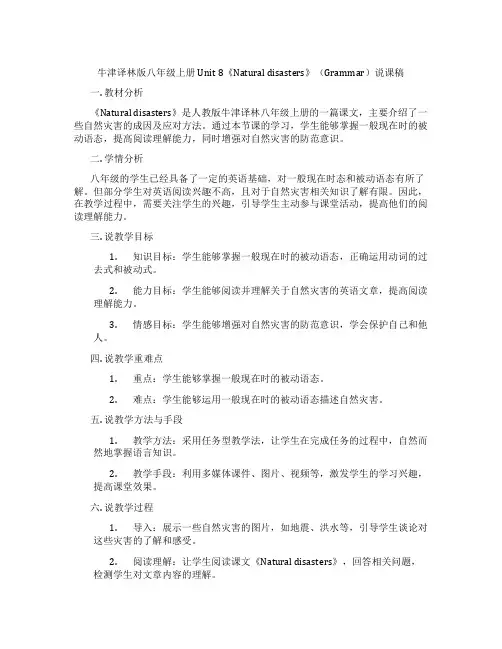
牛津译林版八年级上册Unit 8《Natural disasters》(Grammar)说课稿一. 教材分析《Natural disasters》是人教版牛津译林八年级上册的一篇课文,主要介绍了一些自然灾害的成因及应对方法。
通过本节课的学习,学生能够掌握一般现在时的被动语态,提高阅读理解能力,同时增强对自然灾害的防范意识。
二. 学情分析八年级的学生已经具备了一定的英语基础,对一般现在时态和被动语态有所了解。
但部分学生对英语阅读兴趣不高,且对于自然灾害相关知识了解有限。
因此,在教学过程中,需要关注学生的兴趣,引导学生主动参与课堂活动,提高他们的阅读理解能力。
三. 说教学目标1.知识目标:学生能够掌握一般现在时的被动语态,正确运用动词的过去式和被动式。
2.能力目标:学生能够阅读并理解关于自然灾害的英语文章,提高阅读理解能力。
3.情感目标:学生能够增强对自然灾害的防范意识,学会保护自己和他人。
四. 说教学重难点1.重点:学生能够掌握一般现在时的被动语态。
2.难点:学生能够运用一般现在时的被动语态描述自然灾害。
五. 说教学方法与手段1.教学方法:采用任务型教学法,让学生在完成任务的过程中,自然而然地掌握语言知识。
2.教学手段:利用多媒体课件、图片、视频等,激发学生的学习兴趣,提高课堂效果。
六. 说教学过程1.导入:展示一些自然灾害的图片,如地震、洪水等,引导学生谈论对这些灾害的了解和感受。
2.阅读理解:让学生阅读课文《Natural disasters》,回答相关问题,检测学生对文章内容的理解。
3.语法讲解:讲解一般现在时的被动语态,让学生通过例句和实践,掌握这一语法知识。
4.小组讨论:学生分成小组,讨论如何用英语描述一种自然灾害,以及如何防范。
5.展示与评价:每个小组选择一名代表,展示他们的讨论成果,其他同学和老师进行评价。
6.总结与反思:教师引导学生总结课堂所学,让学生反思自己在课堂上的表现,以及如何提高。
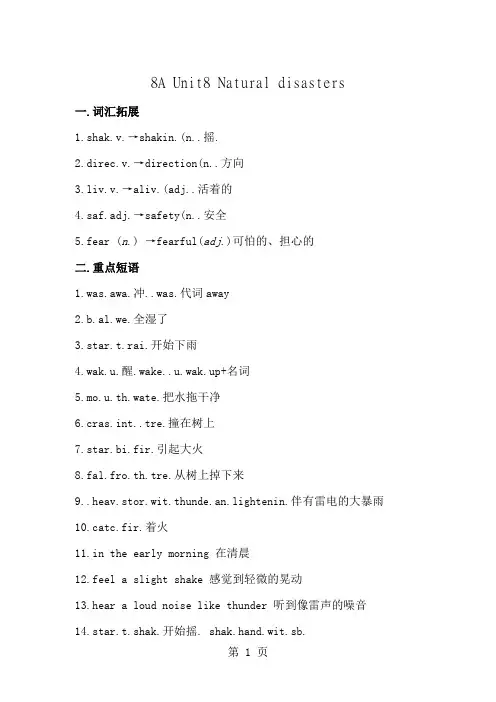
8A Unit8 Natural disasters一.词汇拓展1.shak.v.→shakin.(n..摇.2.direc.v.→direction(n..方向3.liv.v.→aliv.(adj..活着的4.saf.adj.→safety(n..安全5.fear (n.) →fearful(adj.)可怕的、担心的二.重点短语1.was.awa.冲..was.代词away2.b.al.we.全湿了3.star.t.rai.开始下雨4.wak.u.醒.wake..u.wak.up+名词5.mo.u.th.wate.把水拖干净6.cras.int..tre.撞在树上7.star.bi.fir.引起大火8.fal.fro.th.tre.从树上掉下来9..heav.stor.wit.thunde.an.lightenin.伴有雷电的大暴雨10.catc.fir.着火11.in the early morning 在清晨12.feel a slight shake 感觉到轻微的晃动13.hear a loud noise like thunder 听到像雷声的噪音14.star.t.shak.开始摇. shak.hand.wit.sb.15.scream in fear 恐惧地尖叫16.ru.ou.o.th.buildin.跑出楼房17.try my best to run out 尽我所能的跑出18.begin to calm down 开始平静下来19.say to oneself 自言自语20.cal.dow.平静下来21.silen.silenc.silentl.安.寂静的22.no.a.al.一点也不23 find one’s way out 找到出路24.hea.abou.th.fir.听说火.hea.o. 听.hea.from收到...的来.25.Wa.anyon.hurt.有没有受伤? hur.v.adj.26.fea.v.fearfu.fearles.害..momen.o.fea.wen.throug.m.mind.一丝恐...掠过我的脑海。
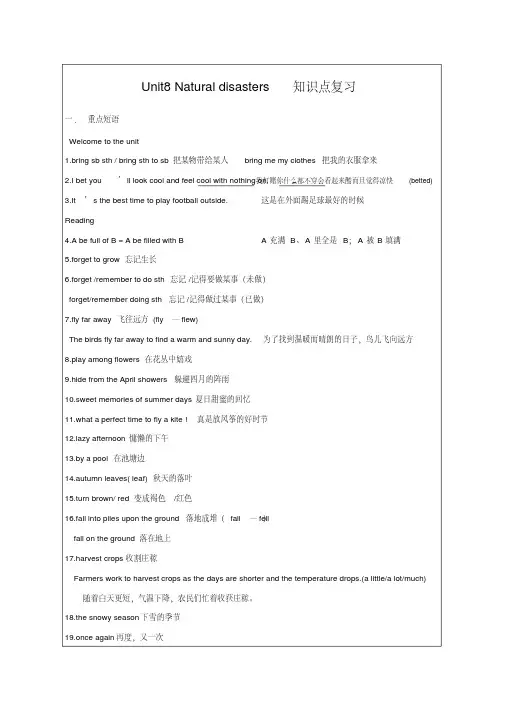
Unit8 Natural disasters知识点复习一.重点短语Welcome to the unit1.bring sb sth / bring sth to sb把某物带给某人bring me my clothes 把我的衣服拿来2.I bet you’ll look cool and feel cool with nothing on.我打赌你什么都不穿会看起来酷而且觉得凉快(betted) 3.It’s the best time to play football outside. 这是在外面踢足球最好的时候Reading4.A be full of B = A be filled with B A充满B、A里全是B;A被B填满5.forget to grow忘记生长6.forget /remember to do sth 忘记/记得要做某事(未做)forget/remember doing sth 忘记/记得做过某事(已做)7.fly far away飞往远方(fly—flew)The birds fly far away to find a warm and sunny day. 为了找到温暖而晴朗的日子,鸟儿飞向远方8.play among flowers在花丛中嬉戏9.hide from the April showers躲避四月的阵雨10.sweet memories of summer days夏日甜蜜的回忆11.what a perfect time to fly a kite ! 真是放风筝的好时节zy afternoon慵懒的下午13.by a pool 在池塘边14.autumn leaves( leaf) 秋天的落叶15.turn brown/ red变成褐色/红色16.fall into piles upon the ground落地成堆(fall—fell)fall on the ground落在地上17.harvest crops收割庄稼Farmers work to harvest crops as the days are shorter and the temperature drops.(a little/a lot/much)随着白天更短,气温下降,农民们忙着收获庄稼。
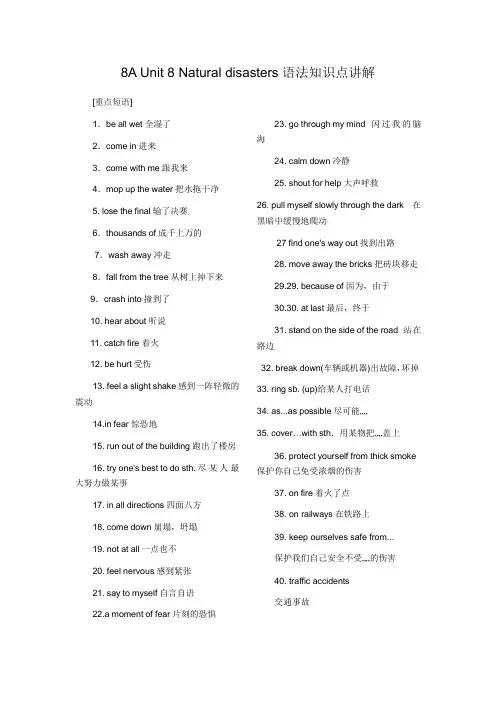
8A Unit 8 Natural disasters语法知识点讲解[重点短语]1.be all wet全湿了2.come in进来3.come with me跟我来4.mop up the water把水拖干净5.lose the final输了决赛6.thousands of成千上万的7.wash away冲走8.fall from the tree从树上掉下来9.crash into撞到了10.hear about听说11.catch fire着火12.be hurt受伤13.feel a slight shake感到一阵轻微的震动14.in fear惊恐地15.run out of the building跑出了楼房16.try one's best to do sth.尽某人最大努力做某事17.in all directions四面八方e down崩塌,坍塌19.not at all一点也不20.feel nervous感到紧张21.say to myself自言自语22.a moment of fear片刻的恐惧23.go through my mind闪过我的脑海24.calm down冷静25.shout for help大声呼救26.pull myself slowly through the dark在黑暗中缓慢地爬动27find one's way out找到出路28.move away the bricks把砖块移走29.29.because of因为,由于30.30.at last最后,终于31.stand on the side of the road站在路边32.break down(车辆或机器)出故障,坏掉33.ring sb.(up)给某人打电话34.as...as possible尽可能……35.cover…with sth.用某物把……盖上36.protect yourself from thick smoke 保护你自己免受浓烟的伤害37.on fire着火了点38. on railways在铁路上39. keep ourselves safe from...保护我们自己安全不受……的伤害40. traffic accidents交通事故41. burn our hands烧伤我们的手42. keep falling(雪、雨等)不停地下43. hear the wind blowing听到风吹的声音44. in the wind在风中二【重点句型】1 Who will mop up the water if I go home without you? 如果你不跟我回家,谁将拖干水呢?2 There was a heavy storm with thunder and lighting. 有一场暴风雨,电闪雷鸣。
8A Unit 8 Natural disasters语法知识点讲解一【课文重点内容和语法】1 about a person surviving an earthquake 关于地震中的幸存者2 to use the new words to talk about a natural disaster story 用新单词来谈论一次自然灾害中的故事3 to use the past continuous tense 使用过去进行时to use when, while and as 使用when,while,和as4 to create compound words 创造复合词二【重点短语】1 wake up 醒来2 crash into 撞上……3 fall from 从……上跌落下来4 mop up 把……拖干净5 wash away 冲走6 catch fire 着火7 feel a slight shake 感到轻微震动8 run out of 从……中跑出9 in all directions 四面八方10 come down 坍塌11 not…at all 一点也不12 a moment of fear 片刻的恐惧13 calm down 冷静下来14 shout for help 呼救15 move away 移开16 find one’s way out 找到出路17 at last 最后,终于18 break down 出故障,坏掉19 because of 因为,由于20 as…as possible 尽可能三【重点句型】1 Who will mop up the water if I go home without you? 如果你不跟我回家,谁将拖干水呢?2 There was a heavy storm with thunder and lighting. 有一场暴风雨,电闪雷鸣。
8A Unit 8 Natural disasters知识归纳与拓展【单词拓展】1.mop. vt. 用拖把擦干净→mopping(进行时) →mopped(过去式)2.shake .vi.& vt.摇动,震动→shake n.摇动,震动→shaking n.摇动,震动→shook(过去式)3.direction .n 方向→direct .adj 直接的→director.n. 导演→indirect.adj.间接的→directly.adv.直接地4.silent .adj.寂静的→silence n.寂静,沉默5.trapped .adj.困住的→trap.vt.使陷入困境→trap. n陷阱6.alive.adj. 活着的→living. adj.活着的→lively.adj.生机勃勃的7.dark.adj. 黑暗→ darkness.n. 黑暗8.safe. adj.安全的→safety n.安全9.asleep adj睡着的→sleep vi.睡觉;睡眠→sleepy adj.困倦的→sleeping adj.睡着的10.burn n.烧伤,烫伤→burn vt.& vi.燃烧,烧毁→burning adj.燃烧的11.clear vt.清除,清理→clear adj.清楚的,清澈的12.loud .adj响亮的,大声的→loudly. adv大声地→aloud. adv.大声地【短语归纳】1.natural disasters自然灾害2.be all wet全湿了3.wake up醒来4.mop up the water把水拖干净5.crash into a tree撞到树上6.wash away冲走7.start a big fire引起一场大火8. a heavy storm with thunder and lightning 一场雷电交加的大暴风雨9.catch fire着火10.be asleep睡着11.hear a loud noise like thunder听到像雷声一样的巨大的噪音12.scream in fear恐惧的尖叫13.in all directions四面八方14.pieces of glass and bricks玻璃块和砖块e down崩塌16.feel nervous感觉紧张不安的17.a moment of fear一阵恐惧18.calm down平静下来19.be still alive仍然活着20.pull oneself slowly through the dark在黑暗中慢慢的向前移动身体21.be trapped被困住的22.find one’s way out找到出路23.keep sb safe保持某人安全24.soon after…在…之后不久25.a terrible snowstorm一场可怕的暴风雪26.break down(车辆或机器)出故障,坏掉27.fall over跌倒28.get out as soon as possible尽早逃出去29.cover one’s month with a wet towel用一块湿毛巾盖住嘴巴30.protect oneself from thick smoke保护自己免受浓烟(的伤害)31.follow the traffic rules遵守交通规则32.traffic accidents交通事故33.burn one’s hand(s)烧/ 烫伤某人的手34.cover the burn with a clear towel用一块干净的毛巾盖住烫伤35.nearly fall over 差一点摔跤36.hear the wind blowing听到风在吹37.see many people waiting there 看到许多人正在那里等候38.because of the heavy snow由于这场大雪39.lose my umbrella in the wind在深雪中慢慢走40.clear the snow from the streets把雪从街上清除掉【重点分析】1. Who will mop up the water if I go home without you?假如我不带着你回家,谁把水拖干净呢?[考点点拨] mop作名词时,意为“拖把”;作动词时,意为“用拖把擦干净”。
译林版英语8A Unit8 Natural disasters知识点整理归纳(学生版)必背单词A.识记类单词1.n.灾难;不幸,祸患___________2.vt.用拖把擦干净_______→过去式______3.n.地震___________4.n.事故,意外的事___________5.n.长途汽车___________6.vi.&.vt.猛撞;碰撞___________7.n.洪水,水灾___________ 8.n.村庄,乡村___________9.n.闪电___________ 10.n.风暴,暴(风)雨___________11.n.雷,雷声___________ 12.adj.轻微的___________13.adj.响亮的;大声的;喧闹的___________ 14.n.炸弹___________ 15.n.害怕,恐惧___________ 16.n.方向___________17.conj.当……的时候,和……同时___________18.n.砖,砖块___________ 19.adj.紧张不安的___________20.n.心脏___________ 21.v.&v.(使)规律作响,作节奏运动___________ 22.adj.困住的___________ 23.n.头脑___________拓展:mind用法________________________________________________________________________________________24.vi.&vt.(使)平静,使)镇定;adj.平静的___________使某人平静下来______________________ 保持平静______________________ 25.c onj.由于,既然___________拓展:since用法________________________________________________________________________________________26.adv.仍然___________ 27.n.呼喊,喊叫声___________28.n.日光___________ 29.n.毛巾,浴巾___________30.n.规则___________ 31.n.铁路___________32.n.烧伤,烫伤,灼伤___________ 33.n.女儿___________34.n.(外)孙女___________ 35.n.儿子___________36.n.(外)孙子___________ 37.n.木板___________38.n.工作日___________ 39.n.头痛___________40.n.牙痛___________ 41.n.乡下,农村___________42.n.家务活___________ 43.n.烙饼,薄饼___________44.adv.几乎,将近___________ 45.vt.清除,清理___________46.adv.在后面___________B.应用类单词1.vi.&.vt.摇动,震动__________ →过去式___________2.adj.寂静的___________→ _________(名词)_________→(副词)=___________3.adj.活着的___________→___________ (同义词)4.adj.安全的→___________(名词)→___________(副词)5.adj.睡着的___________→ ___________ (动词)6.vi.损坏;打破___________→___________(形容词)拓展:与break相关的短语:break down ___________break out___________break up___________ break into___________必背短语1.把地面拖干净______________________2.成千上万的人______________________3.把村庄冲走__________________ 电闪雷鸣的大风暴____________________4.从树上跌下来______________________5.撞到树上______________________ 车祸______________________6.感到轻微的震动______________________ 巨大的噪音____________________7.恐惧地看着彼此______________________8.四处奔跑______________________ 在相同的方向______________________9.镇定下来______________________10.尽我最大的努力跑出来______________________11.片刻的恐惧______________________ 害怕地尖叫_____________________12.听到我上面有一些声音______________________13.坍塌______________________ 下落______________________14.玻璃和砖块______________________15.一点也不______________________16.跳地快______________________ 17.自言自语______________________ 18.仍然活着______________________辨析:alive,living,lively______________________________________________________________________________________________________________________________________________________________________________________________________ 19.跟我来______________________ 20.着火______________________21.被困在小汽车里_________________________________22.给我腾出点空间_________________________________23.移开砖块______________________24.尖叫着喊救命____________________ 25.最后安全了____________________ 26.一场强风暴____________________27.袭击这个城市______________________ 28.在风中______________________ 29.因为寒冷的天气____________________ 30.伤了她的左腿__________________31.引起自然灾害______________________ 32.和她合用一把雨伞______________________33.摔倒______________________34.上个星期的这个时候______________________35.在路边______________________ 36.找到出路______________________37.用湿毛巾捂住你的嘴/烧伤______________________38.着火的楼房______________________★39.尽可能快地______________________ =______________________40.去看病______________________41.听到车辆的声音______________________42.清理雪______________________43.准守交通规则______________________44.贴近地面______________________45.保护某人免受车祸______________________必背句型1.我正在睡觉,突然下起雨来。
牛津英语8A Unit8 单元知识梳理【单词拓展】1.loud adj.响亮的,大声的→loudly adv.大声地→ aloud adj 大声的2.shake vi.& vt.(shook;shaken) 摇动,震动→shake n.摇动,震动→shaking n.摇动,震动3.silent adj.寂静的→silence n.寂静,沉默4.trapped adj.困住的→trap vt.使陷入困境→trap n.陷阱5.safe adj.安全的→safety n.安全6.asleep adj.睡着的→sleep vi.睡觉”.睡眠→sleepy adj.困倦的→sleeping adj.睡着的7.burn n.烧伤,烫伤→burn vt.& vi.燃烧,烧毁→burning adj.燃烧的8.clear vt.清除,清理→clear adj.清楚的,清澈的→ clearly adv.清晰地【高频词汇】1. mind(1) n. 思想,精神,理智可用作可数名词,也可用作不可数名词;表示“智力”“记忆(力)”是不可数名词;也可表示“有才智的人”(可数名词)。
Great minds think alike. 英雄所见略同。
(谚语:mind 用复数形式)Concentrate your mind on study.Don't look around.(2) vi. & vt. 留心;注意;介意;在乎mind的基本意思是“留心”“注意”“当心”,强调全心全意去注意。
可用作及物动词,也可用作不及物动词,用作及物动词时,接名词、代词、动词不定式(多为否定式)、动名词或that/wh-从句作宾语。
They don't seem to mind a bit.Just go about your work and don't mind him.【知识拓展】---名词:change one's mind改变主意keep in mind记在心上lose one's mind失去理智make up one's mind to do sth. 下定决心去做某事Never mind 没关系---动词:mind (one’s)doing sth. 介意(某人)做某事疑问句:Would you mind doing sth.?回答:不介意:Not at all/Certainly not/Of course not.介意:You’d better not.2.shake(1) n. 摇动,震动基本意思是“摇动”,也可表示“震动,颠簸”,是可数名词,一般与a连用shake还可表示“哆嗦,发颤”,常用复数形式shakes,其前加定冠词the例句:He gave the child a shake.I began to get the shakes just thinking about the test.(2) vi. & vt.摇动,震动基本意思是“(使) 急速摇动或颠簸”,既可用作及物动词,也可用作不及物动词作不及物动词,可表示“发抖,打战,发颤”;作及物动词时,还可表示“动摇”某人的想法、信念、信仰等例句:The house shakes when a train goes by.The doctor shook her head.【知识拓展】①shake off 逃脱,摆脱eg: The dog flew at me, but I shook it off.① shake hands with sb. 和某人握手eg:Chinese meet those important people by shaking hands with them.3. alive adj. 活着的alive,lively,living,live(1) alive adj. 在句子中可以作定语,表语,宾语补足语。
Unit 8 Natural disastersReading1. It was about two o'clock in the early morning. I was sleeping when the earthquake started.At first, I felt a slight shake. Then I heard a noise like thunder.(1) in the early morning 大清早,在清晨,还可以说成early in the morning。
in the late afternoon/late in the afternoon在下午晚些时候,在傍晚。
(2)I was sleeping when the earthquake started.的句型结构①本句型结构的意思为:某事过去正在发生,就在那时,另一件事随之发生②其中的连词when不能被其他连词所取代③注意主句和从句中时态的正确使用如:a) He was just falling asleep when there was a loud knock at the door.b) The children were leaving school on Tuesday when they saw a truck.(3)feel a slight shake的含义:感觉到轻微的常动。
①请注意学习slight的词性及含义:adj轻微的,微小的,如: I have a slight headache.我有点轻微的头疼。
②其比较级和最高级形式为slighter和slightest(4) shake的含义及词性:n摇动,挥动;也可以作vt&ⅵ摇动,摇,颤抖,震动。
(5)like的不同词性及用法:此处为介词,像……一样练习1) Yesterday evening I was playing the piano____the doorbell rang.A. whenB. beforeC. whileD. after2)We _______ TV when the telephone _______.A. watched; was ringingB. were watching; rangC. watch; ringsD. are watching; rang3)清洁工们一大清早就起来工作了The cleaners got up to work ______________________________________________.4)我刚才感觉到身体一阵轻微的震动。
译林版牛津初中英语八年级上册Unit8Natural disasters知识点归纳及巩固练习题1. disaster n. 灾难;不幸,祸患natural disasters 自然灾害2. mop vt. 用拖把擦干净(mopped mopping)up adv 完全地mop up / eat up /clean up /use upmop up 拖干,把......拖干(mop it /them up)eg. Hobo wants Eddie to mop up all the water. earthquake n. 地震an earthquake in the earthquake eg. There was an earthquake in Sichuan in 2008.4. 1)thousands of 成千上万的/hundreds of 成百上千的/ millions of 成百万的+名词复数eg. Thousands of people lost their lives in the earthquake.There a re thousands of people on the road.2)数词+hundred/thousand/million+名词复数There are three thousand students in our school.5. accident n. 事故,意外的事eg. There was a car accident yesterday.昨天有一场交通事故。
A car accident killed three men three days ago.Three men lost their lives in the car accident three days ago. 在三天前的一场交通事故中三人丧生。
6. coach n. 长途汽车(coaches) get on/off the coachIt took us three hours to go to Nanjing by coach. .7. crash vi. & vt. 猛撞;碰撞crash into 猛撞,碰撞eg. A car crashed into a tree last night. 昨天晚上一辆车猛撞到一棵树上。
译林版牛津初中英语八年级上册Unit8Natural disasters知识点归纳及巩固练习题
1. disaster n. 灾难;不幸,祸患natural disasters 自然灾害
2. mop vt. 用拖把擦干净(mopped mopping)
up adv 完全地mop up / eat up /clean up /use up
mop up 拖干,把......拖干(mop it /them up)eg. Hobo wants Eddie to mop up all the water. earthquake n. 地震an earthquake in the earthquake eg. There was an earthquake in Sichuan in 2008.
4. 1)thousands of 成千上万的/hundreds of 成百上千的/ millions of 成百万的+名词复数
eg. Thousands of people lost their lives in the earthquake.There a re thousands of people on the road.
2)数词+hundred/thousand/million+名词复数There are three thousand students in our school.
5. accident n. 事故,意外的事eg. There was a car accident yesterday.昨天有一场交通事故。
A car accident killed three men three days ago.
Three men lost their lives in the car accident three days ago. 在三天前的一场交通事故中三人丧
生。
6. coach n. 长途汽车(coaches) get on/off the coach
It took us three hours to go to Nanjing by coach. .
7. crash vi. & vt. 猛撞;碰撞crash into 猛撞,碰撞
eg. A car crashed into a tree last night. 昨天晚上一辆车猛撞到一棵树上。
8.flood n 洪水 a terrible flood 一场可怕的洪水
9.wash away 冲走wash away the village 冲走这个村庄wash them away
eg. A terrible flood washed away his house.
10. village n 村庄,乡村(villager 村民)
in the village 在村子里 a small village 一个小村子
11 thunder n 雷声,雷lightning n 闪电thunder and lightning 电闪雷鸣
The lightning started a big fire in the classroom building.
12.storm n 风暴, 暴风雨
There was a heavy storm with thunder and lightning last week.
13. catch fire 着火(强调动作)be on fire 着火, 失火(强调状态)
eg. Look!The house is on fire. The house caught fire yesterday.
shake vi.& vt. 摇动,震动过去式是shook, shake slightly轻微震动
Look! The trees are shaking in the strong wind.shake hands with sb 与某人握手
n. 摇动,震动 a slight shake一阵轻微的震动
shaking n. 摇动,震动Finally, the noise and shaking ended.
15. behind adv.在后面come from behind
16. loud adj. 响亮的;大声的;喧闹的in a loud voice大声地
Please speak louder. I can’t hear you clearly. 请大声点讲话。
我听不清楚你说的话。
loudly adv.大声地,吵闹地(有时强调声音高,吵闹,不悦耳),其基本意义与loud 相同,
还常与ring,knock 等动词连用。
Suddenly the bell on the wall rang loudly. 突然,墙上的铃大声地响起来。
Don't talk so loud (loudly)--you'll wake the whole street. 别那么大声说话,你快把左邻右舍都吵
醒了。
17. clear vt. 清除,清楚clear the snow
18. fear n. 害怕,恐惧 a moment of fear一丝(阵)恐惧,scream in fear惊慌的尖叫
The girl is _afraid(害怕)of lightning and thunder. The cat ran away quickly in fear(恐惧).。